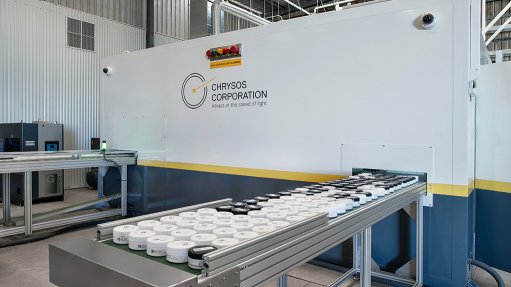Support For The Automotive Industry Is Essential
This article has been supplied as a media statement and is not written by Creamer Media. It may be available only for a limited time on this website.
Company Announcement - South Africa is a developing economy that is still in the process of industrialising.This stage is characterised by the need to develop both its upstream and downstream industries using the wealth from its resource base. In South Africa’s case, as is the case in many other African countries, this constitutes using their mineral and labour resources to create economic growth. Only in this way, can we create sustainable economic growth and achieve our prime objectives, namely increasing employment and reducing unemployment, poverty alleviation and raising standards of living of all citizens. The country is in real danger of doing the opposite.
Growth in manufacturing and mining production over the period 2008 to 2014 has been negative at -0.3% and -1.2%, respectively. Total employment growth for the economy in the period 2008 to 2014 according to the Quarterly Labour Force Survey totalled 561,500, of which the majority has been in the community services, finance and transport sectors. Over this period some 374,000 jobs have been lost in the agriculture, manufacturing and trade sectors.Far from growing the manufacturing, mining, mining beneficiation and the goods-producing sectors - as the National Development Plan and previous growth plans of the country have required - South Africa has in practice been de-industrialising. A good example of the importance of the goods producing sector is the automotive industry. The sector is estimated to contribute approximately 6.8% (2013) of the Gross Domestic Product.
The core automotive industry (vehicle and component manufacturers and assemblers) supports a wide range of business segments in South Africa, both upstream and downstream, along with adjacent industries. The industry spans across the primary, secondary and tertiary sectors of the South African economy - from agriculture and mining, to the manufacturing and service industries. Due to its vast linkages across these industries, the automotive industry has had a large multiplier effect on the domestic economy. Although the automotive industry is a net importer, its diverse manufacturing and components base means that the industry’s exports and import substitution benefits far exceed the total costs of its import requirements. The South African automotive industry serves as a fine illustration of the type of industry that should be fostered. More than that, it offers a secure base and ideal location for multi-national motor companies to locate operations aiming to export into the potentially huge African market and other markets of the world. Many motor companies have long and important historical associations with the country. Every effort has to be made to maintain and grow the automotive manufacturing industry as a strategic long-term industry in this country, otherwise we could possibly lose out to other potential manufacturing bases of supply in Africa, such as Nigeria.
This requires an understanding of some of the difficulties and special requirements that manufacturing industries generally need. For example, the production of motor vehicles is dependent on components delivered from many domestic and overseas locations. Modern manufacturing techniques require reducing costs by utilising just-in-time delivery principles to compete with efficient factories based elsewhere in the world. It is also a multi-market operation. A decline in major markets can be a factor affecting sales and hence production. The impact on different industries and on different companies within the same industry can be substantial depending on their respective markets and sources of material. There are many factors that can affect delivery and meeting targets, ranging from strike action and other man-made disruptions, to natural causes such as storms. Domestically these problems are compounded by electricity shortages, load shedding and the recent spate of labour problems.
With such a widespread delivery chain, it is inevitable that targets may not be met and this could affect companies very differently, for example companies with a major share of the European market will be profoundly affected because of the economic downturn in that region. In the instance of the motor industry - where quotas are governed by the Automotive Production and Development Programme (APDP)- the guidelines states: “If an OEM (original equipment manufacturer) should experience difficulties in achieving set production volumes due to, for instance, a global economic slowdown, prolonged strike action etc, it may approach the minister requesting temporary reprieve.” While some may say that this is not a good idea, for various reasons, in many industries, and in the automotive industry in particular, subject to the necessary oversight, such discretion is necessary for international companies to survive in a world of global competition. The Economic Development Minister Ebrahim Patel recently exercised this discretion. Under these conditions, the ruling in favour of Nissan and General Motors was essential in view of the exceptional circumstances in the European market.
The automotive industry has been a bright star over the past decade in an otherwise lacklustre performance in the South African manufacturing industry. In this globally competitive world, it is essential that such a vital industry be given every support as it is a most important cog in South Africa’s manufacturing and industrial growth strategy.
Comments
Press Office
Announcements
What's On
Subscribe to improve your user experience...
Option 1 (equivalent of R125 a month):
Receive a weekly copy of Creamer Media's Engineering News & Mining Weekly magazine
(print copy for those in South Africa and e-magazine for those outside of South Africa)
Receive daily email newsletters
Access to full search results
Access archive of magazine back copies
Access to Projects in Progress
Access to ONE Research Report of your choice in PDF format
Option 2 (equivalent of R375 a month):
All benefits from Option 1
PLUS
Access to Creamer Media's Research Channel Africa for ALL Research Reports, in PDF format, on various industrial and mining sectors
including Electricity; Water; Energy Transition; Hydrogen; Roads, Rail and Ports; Coal; Gold; Platinum; Battery Metals; etc.
Already a subscriber?
Forgotten your password?
Receive weekly copy of Creamer Media's Engineering News & Mining Weekly magazine (print copy for those in South Africa and e-magazine for those outside of South Africa)
➕
Recieve daily email newsletters
➕
Access to full search results
➕
Access archive of magazine back copies
➕
Access to Projects in Progress
➕
Access to ONE Research Report of your choice in PDF format
RESEARCH CHANNEL AFRICA
R4500 (equivalent of R375 a month)
SUBSCRIBEAll benefits from Option 1
➕
Access to Creamer Media's Research Channel Africa for ALL Research Reports on various industrial and mining sectors, in PDF format, including on:
Electricity
➕
Water
➕
Energy Transition
➕
Hydrogen
➕
Roads, Rail and Ports
➕
Coal
➕
Gold
➕
Platinum
➕
Battery Metals
➕
etc.
Receive all benefits from Option 1 or Option 2 delivered to numerous people at your company
➕
Multiple User names and Passwords for simultaneous log-ins
➕
Intranet integration access to all in your organisation

















